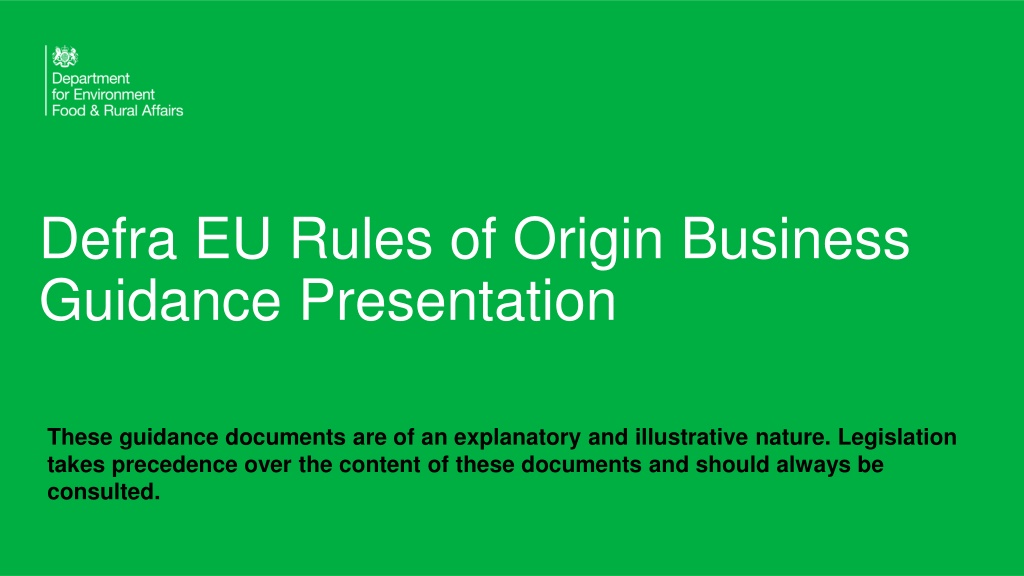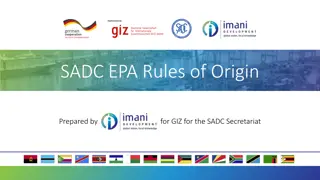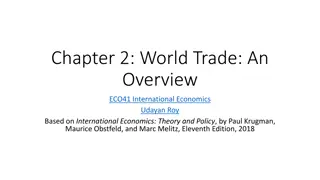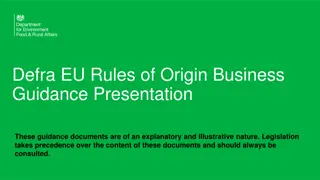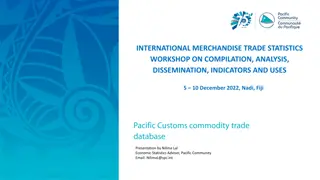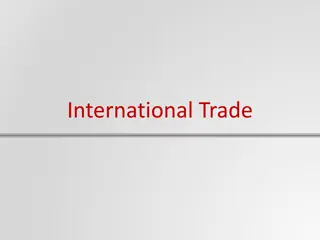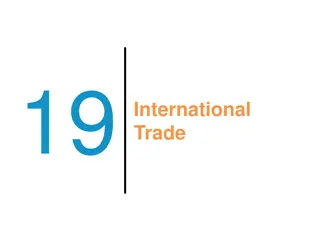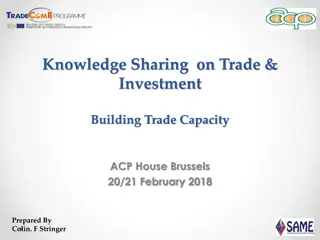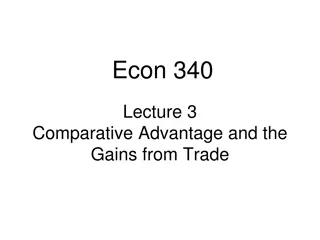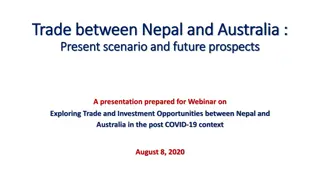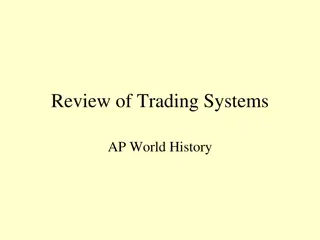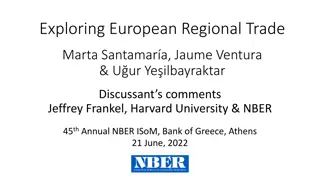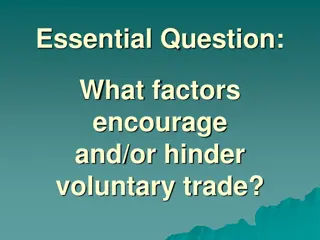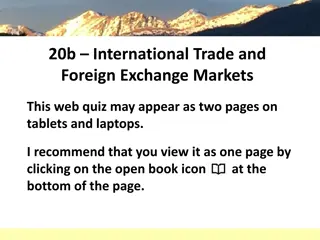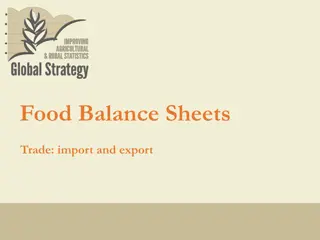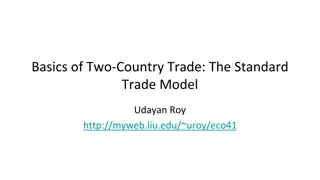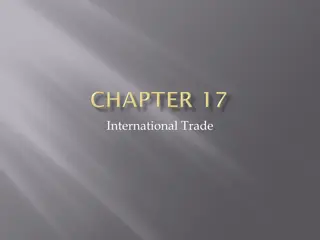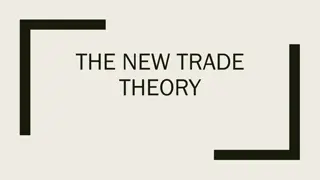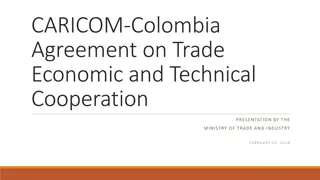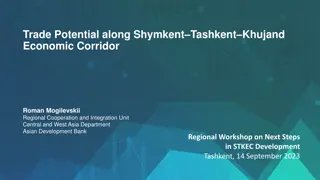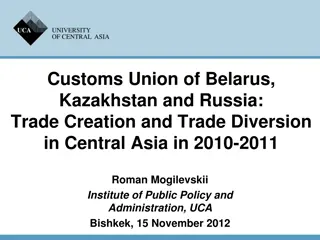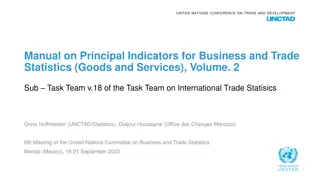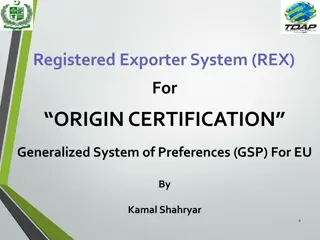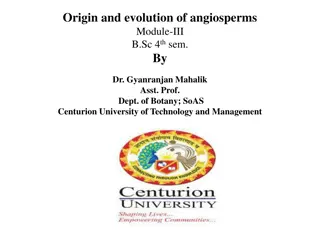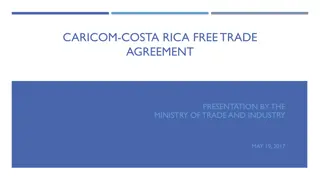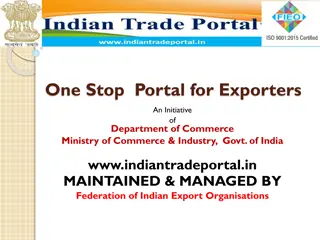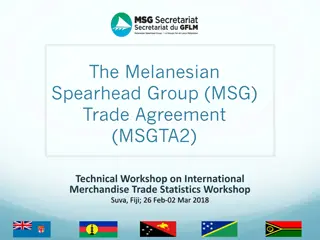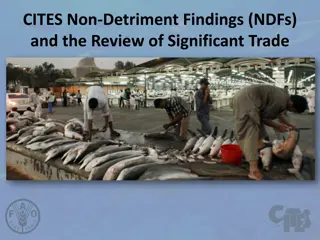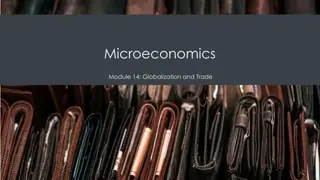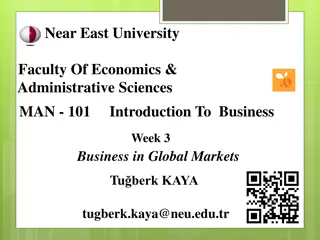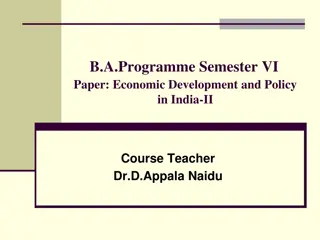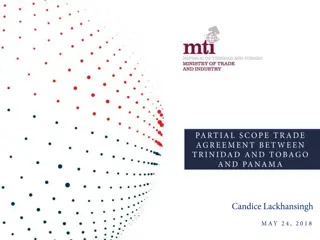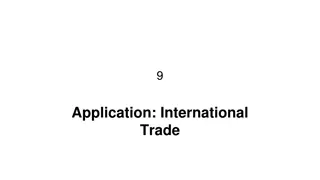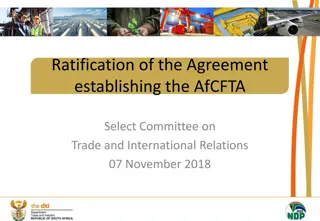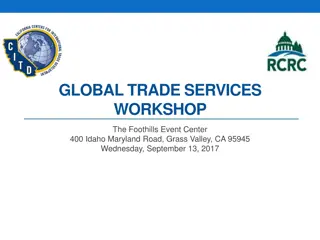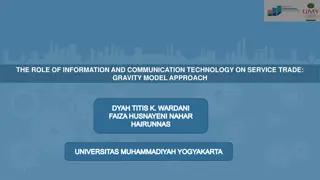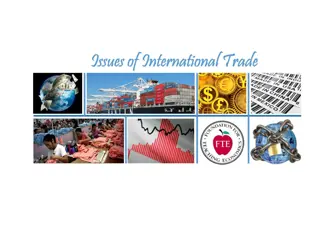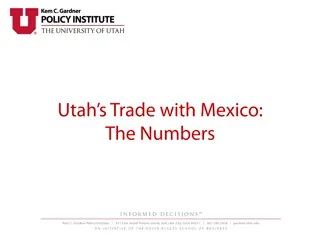Understanding Rules of Origin in EU-UK Trade
Rules of Origin (RoO) are essential in determining the economic nationality of products for tariff classification in EU-UK trade. Compliance with RoO is necessary for accessing preferential tariff rates under free trade agreements. This guidance outlines the principles, conditions, and requirements for proving the origin of goods to benefit from tariff reductions. Specific rules for different products and guidelines for trading with the EU post-transition period are discussed, emphasizing the importance of RoO certification.
Download Presentation

Please find below an Image/Link to download the presentation.
The content on the website is provided AS IS for your information and personal use only. It may not be sold, licensed, or shared on other websites without obtaining consent from the author. Download presentation by click this link. If you encounter any issues during the download, it is possible that the publisher has removed the file from their server.
E N D
Presentation Transcript
Defra EU Rules of Origin Business Guidance Presentation These guidance documents are of an explanatory and illustrative nature. Legislation takes precedence over the content of these documents and should always be consulted.
What are Rules of Origin? Rules of Origin (RoO) are used to determine the economic nationality of a product and by customs authorities to classify where an export has come from in order to work out tariffs and restrictions. Under a free trade agreement (FTA), exporters must prove that a good is originating according to preferential RoO in order to access preferential tariff rates. RoO in FTAs prevent third countries from accessing, at a preferential rate, the markets of countries with whom they do not have a trade deal. Preferential RoO are used for the purpose of granting access to preferential tariff rates, for example a zero tariff, agreed between FTA partner countries. If rules cannot be met the importer would pay the MFN tariff, which for agri-food products can be very high. General provisions provide the guiding principles and conditions for acquiring originating status for products. General provisions relevant to agri-food products include Wholly Obtained, Bilateral Cumulation, Insufficient Processing, Tolerance and Accounting Segregation. Product-specific rules (PSRs) are a list of specific rules for all products in the Harmonised System (HS). These vary according to the agreement. Defra EU Rules of Origin Business Guidance
Trading with the EU To trade with the EU tariff-free after the transition period you will need to comply with RoO. RoO are designed to ensure that only producers party to the EU-UK Free Trade Agreement (FTA) benefit from tariff reductions. You and your suppliers will need to know where your materials or ingredients come from - both ingredients imported from abroad and ingredients bought within the UK. Rules for each product, which determine the imported ingredients you can use, will be specified in the EU-UK FTA. You will need to complete the RoO certification process to prove that your good is eligible for tariff reductions. Defra EU Rules of Origin Business Guidance 3
Products that are automatically eligible for preferential treatment (UK wholly originating ) Plants and vegetable products grown or harvested in the UK; Products obtained solely from live animals raised in the UK or slaughtered animals born and raised in the UK; Products obtained from aquaculture in the UK; Fish caught within UK territorial waters; Fish caught beyond territorial waters by vessels registered in UK or EU and flagged in the UK or by EU Member State, and meeting UK or EU ownership requirements. Defra EU Rules of Origin Business Guidance 4
General principles You may use EU-originating materials in your final good, provided that the EU material undergoes further processing in the UK (bilateral cumulation). If a rule limits the use of non-originating materials, the final product could be considered UK originating if the value or weight of applicable non-originating materials used does not exceed 15 per cent of the net weight of the final product or, for fisheries products, 10 per cent of the value (ex-works price) of the final product (tolerance). Defra EU Rules of Origin Business Guidance 5
Change of Tariff Classification (CTC) Rules CTC rules are used across the EU-UK FTA for many different products. They can be accompanied by content restrictions and exclusions for imported inputs. Products are classified by names and numbers using the Harmonised System (HS). The main categorisations are chapters (2 digits), headings (4 digits) and subheadings (6 digits). You can find the classification for your product at the Government s Trade Tariff site. Categorisation HS Code 18 Description As an example of how CTC rules and HS codes work, take chocolate products of HS Chapter 18. If non-originating milk from Chapter 4 was used in a chocolate bar of Chapter 18 this would meet a Chapter Change (CC) rule (imported content is from a different chapter). Cocoa and cocoa preparations Cocoa beans Not filled chocolate in blocks, slabs or bars Chapter If non-originating cocoa from heading 18.01 was used in chocolate of 18.06 this would meet a Change of Heading (CTH) rule (imported content is from a different heading). 18.01 1806.32 Heading Subheading If a non-originating unfilled chocolate under subheading 1801.31 was processed into filled chocolate of 1806.32 this would meet a Change of Sub-Heading (CTSH) rule (imported content is from a different subheading). 6 Defra EU Rules of Origin Business Guidance
This guidance applies after the transition period ends. For further information on the points covered in this presentation you can refer to the more detailed Defra EU Rules of Origin Business Guidance document. Defra EU Rules of Origin Business Guidance 7
Example 1 Meat products of Chapters 2 (Meat and edible meat offal) and 16 (Preparations of meat) The rule for Chapter 2 is wholly obtained. This means that all meat products must be obtained from slaughtered animals born and raised in the UK. The rule for preparations of meat in Chapter 16 is production in which live animals, meat, and preparations of meat used are wholly obtained. Bilateral cumulation would allow the use of EU content if processing goes beyond insufficient. UK Processing Ingredients Live pigs from the EU Pigs are slaughtered Factory produces ham Sufficient Processing? (PSR) Bilateral cumulation with the EU applies as skilled butchery goes beyond insufficient processing Bilateral cumulation with the EU does not apply as only slaughtering is considered insufficient processing Live pigs from the EU Pigs are slaughtered Pork loin from the EU Bilateral cumulation with the EU applies as processing goes beyond insufficient processing Factory produces bacon Chicken meat from Thailand or Brazil Meat imported from outside the UK or EU cannot be used Factory produces chicken nuggets Beef sirloin from the EU Bilateral cumulation with the EU applies as dry ageing (giving the meat new flavour) goes beyond insufficient processing The beef sirloin is dry aged for 30 days
Example 2 Fish products of Chapters 3 (Fish and crustaceans, molluscs and other aquatic invertebrates) and 16 (Preparations of fish or of crustaceans, molluscs or other aquatic invertebrates) The rule for Chapter 3 is wholly obtained. This means fish must be farmed or caught within 0-12 nautical miles. For fish caught outside UK territorial seas, vessels must be UK or EU registered, UK or EU Member State flagged and have a 50% UK or EU ownership structure. The rule for preparations of fish in Chapter 16 is wholly obtained, with some exceptions. For preparations of surimi and certain other processed products, fish from Chapter 3 can be imported and used in the product. Bilateral cumulation would allow the use of EU content if processing goes beyond insufficient. UK Processing Ingredients Sufficient Processing? (PSR) Haddock from Icelandic vessel Fish caught by a non- UK or EU vessel cannot be used The haddock is processed into haddock fillets The rule has been met as the fish was caught by a UK vessel Haddock from UK vessel The haddock is processed into haddock fillets Salmon Seedstock from Norway Fish farmed from imported seedstock can be considered wholly obtained The salmon is processed into fresh and processed products Salmon is raised Whitefish from chapter 3 can be imported from outside the UK and EU. Note: This rule only applies to certain products in the chapter Fish from Norway (Chapter 3) The fish is processed into fish fingers (1604.19)
Example 3 Dairy products of Chapter 4 (Dairy produce; birds eggs; natural honey; edible products of animal origin, not elsewhere specified or included) The rule for this chapter requires wholly obtained dairy ingredients. Therefore, all dairy inputs must be obtained from live animals raised in the UK. Bilateral cumulation would allow the use of EU content if processing goes beyond insufficient. The rule also states that non-originating sugar cannot exceed 20% of the weight of your final product. Sufficient Processing? (PSR) Ingredients UK Processing The rule has been met as the milk is from cows born and raised in the UK The milk is pasteurised or made into cheese Milk from cows born and raised in the UK Bilateral cumulation with the EU applies as processing goes beyond insufficient processing . The milk is processed Milk from imported EU dairy cows Yogurt is produced. The weight of the sugar used does not exceed 20% the weight of the yogurt. Use of non-UK or EU sugar is permitted if it does not exceed the weight thresholds Milk from the UK and refined cane sugar from Belize Bilateral cumulation with the EU does not apply as 'labelling' is an insufficient process Bulk yoghurt from the EU The yoghurt is only labelled
Example 4 Flour products of Chapters 11 (Products of the milling industry; malt; starches; inulin; wheat gluten) and 19 (Preparations of cereals, flour, starch or milk; pastrycooks products) Products of the milling industry must be wholly obtained which means produced from UK-originating cereals. Preparations of cereals in Chapter 19 can use imported cereals, flours and other products of the milling industry. There are, however, restrictions on non-originating meat, fish, aquatic invertebrates, rice, starches, inulin and sugar. Dairy used must be wholly obtained which means that all dairy inputs must be obtained from live animals raised in the UK Bilateral cumulation would allow the use of EU content if processing goes beyond insufficient. Sufficient Processing? (PSR) Ingredients UK Processing The rules has not been met as cereals imported from outside the UK or EU cannot be used when directly exporting flour. Wheat from Canada Factory produces flour Wheat from Canada Factory produces cereal bars Factory puffs wheat The rules has been met for products manufactured from wheat imported from outside the UK and EU provided the dairy used is from the UK or EU and non-originating weight thresholds for sugar are met. Wheat from Canada Factory produces flour Factory produces bread Wheat from Canada Factory produces flour Factory produces pasta The rule has been met as imported flour from outside the UK and EU can be used Flour from Turkey Factory turns into pasta
Example 5 Fruit, nut and vegetable products of Chapters 7 (Edible vegetables and certain roots and tubers) and 8 (Edible fruit and nuts; peel of citrus fruit or melons) The rule for these chapters is wholly obtained which means that all vegetables and fruit must be grown and harvested in the UK. Bilateral cumulation would allow the use of EU content if processing goes beyond insufficient. The rule for Chapter 8 also states that non-originating sugar cannot exceed 20% of the weight of your final product. UK Processing Ingredients Sufficient Processing? (PSR) Bilateral cumulation with the EU applies as automated processing goes beyond insufficient. Mixed vegetables from the UK and EU Vegetables are diced, mixed and packaged with machinery installed for that specific purpose Vegetable seeds from outside UK or EU Vegetables produced from imported seeds, bulbs, cuttings etc. can be considered wholly obtained Vegetables are grown and harvested in UK Bananas are imported from the EU The rules has not been met for bananas as EU originating content must be further processed A wholesaler combines bananas with other UK- grown fresh fruit for onward export Nuts are imported from the EU Bilateral cumulation does not apply as 'shelling' is an insufficient process Nuts are shelled
Example 6 Processed Fruit, nut and vegetable products of Chapters 20 (preperations of vegetbales, fruit, nuts or other parts of plants) The rule for this chapter is change of heading which means that fruit, nut and vegetables from chapter 7 and 8 can be imported as well as processed fruit, nut and vegetables from different headings within chapter 20. There are, however, wholly obtained requirements for tomatoes and mushroom meaning they need to be grown and harvested in the UK. The rule also states that non-originating sugar cannot exceed 40% of the weight of your final product. Bilateral cumulation would allow the use of EU content if processing goes beyond insufficient. UK Processing Ingredients Sufficient Processing? (PSR) Bilateral cumulation with the EU applies as processing goes beyond insufficient. Therefore, even though tomatoes need to be wholly obtained, the rule is met. Tomatoes are processed into tinned tomatoes Tomatoes from the UK and EU The rules has been met as imported oranges from outside the UK and EU can be used provided non- originating weight thresholds for sugar are met Oranges from Morocco Oranges are processed into marmalade The rules has not been met as imported mushrooms from outside the UK or EU cannot be used due to the wholly obtaiend requirement for mushrooms Mushrooms from China Mushrooms are processed into tinned mushrooms Mixed fruit from the UK, EU and Brazil The rules has been met as imported fruit from outside the UK and EU can be used provided non- originating weight thresholds for sugar are met Fruit is processed into fruit juice
Example 7 Chocolate products of Chapter 18 (Cocoa and cocoa preparations) Chocolate of 1806 has a change of heading rule, with requirements for wholly obtained dairy and non-originating sugar not exceeding 40% of the weight or 30% of the value. Bilateral cumulation would allow the use of EU content if processing goes beyond insufficient. UK Processing Ingredients Cocoa beans from Ghana, refined beet s ugar from the EU and milk from the UK Sufficient Processing? (PSR) Bilateral cumulation with the EU applies and allows for EU sugar to be used when processed into a chocolate bar. A chocolate bar is in a different heading to cocoa beans so use of imported cocoa beans from outside UK and EU is permitted. Beans are processed into a cocoa liquor and this is mixed with sugar and milk to produce chocolate. A chocolate bar is in a different heading to cocoa beans so use of imported cocoa beans s from outside UK and EU is permitted. Use of non UK or EU sugar is permitted if it does not exceed the weight or value thresholds. Cocoa beans from Ghana, refined cane sugar from Belize and milk from the UK Beans are processed into a cocoa liquor and this is mixed with sugar and milk to produce chocolate. The value of the sugar used does not exceed 30% the value of the chocolate bar. Cocoa beans from Ghana, refined beet sugar from the UK and refined cane from Belize and milk from the UK Beans are processed into a cocoa liquor and this is mixed with sugar and milk to produce chocolate. Half the sugar is EU beet sugar and half is cane sugar from Belize. If the total weight of sugar is 60% of the total weight of the chocolate bar, then 30% of the weight belongs to Belize sugar. Bilateral cumulation with the EU applies and allows for EU beet sugar to be used. Use of sugar from Belize is permitted as long as it does not go beyond the weight or value thresholds. Meeting the threshold can be averaged over multiple shipments.
Example 8 Animal feed products of Chapter 23 (Residues and waste from the food industries; prepared animal fodder) The rule for animal feed is change of heading, with meat and dairy having to be wholly obtained and weight restrictions on non-originating cereals (except rice and maize), starches and residues, and sugar. Bilateral cumulation would allow the use of EU content if processing goes beyond insufficient. Sufficient Processing? (PSR) Ingredients UK Processing Meat from New Zealand and rice from India Meat cannot be sourced from outside the UK or EU. A factory processes the inputs into pet food Meat, dairy and sugar from the UK, rice from India The use of imported rice is permitted. The other ingredients are UK wholly obtained. A factory processes the inputs into pet food Fish from Norway, dairy and oats from the US The use of imported fish is permitted but dairy and oats must be sourced from the UK or EU A factory processes the inputs into pet food
Proving Origin When Importing Goods In order for your business to pay preferential tariffs when importing into the UK, you will need to claim preference as part of your customs declaration to HMRC. You will need to hold proof that the goods you are importing qualify as originating. For example, under the EU-UK FTA, the claim for preference is made on the basis of either: a statement on origin which declares the goods to be originating; or importer s knowledge that the goods are originating. If you are using a statement on origin, this should be provided to you by the exporter on a commercial document. If you wish to use importer s knowledge , you will need to obtain sufficient evidence that the goods qualify as originating. This may involve the exporter providing a range of supporting documentation, but there is no specific requirement for the exporter to provide a statement on origin. Other agreements may set out alternative methods for claiming preference. For example, older agreements can require a paper certificate of origin to be provided by the exporter. Defra EU Rules of Origin Business Guidance 16
Proving Origin When Exporting Goods In order for your customer to claim preference when they import your goods into their country, you need to ensure that your goods meet the Product-Specific Rules of origin (PSRs). If your goods do meet the PSRs, you will need to hold evidence of this. You may also require separate declarations from your suppliers (supplier declarations). Under most modern agreements, you can self-declare that your goods are originating. Under the EU-UK FTA, you can make out a statement on origin on a commercial document and send this to your customer. This is a statement declaring the goods to be originating and can be used by your customer as the basis of their preference claim. Some agreements, including the EU-UK FTA, also allow importers to claim preference based on knowledge they hold ( importer s knowledge ), rather than through a statement on origin. Where this option is used, you do not need to provide your customer with a statement on origin, though your customer may ask you to provide them with a range of information about the goods to support their preference claim. Under some older agreements, you cannot self-certify that goods are originating, and you may need to provide your customer with a certificate of origin obtained through your local Chamber of Commerce or HMRC. Defra EU Rules of Origin Business Guidance 17
Rules of Origin Five Steps Process: Trading the EU after 1st January 2021 1. Understand your supply chains If you are importing or exporting goods to the EU, they will only be eligible for zero tariffs if they acquire originating status. You will need to know the status of your materials, where they have come from and what processing on the materials has occurred. This may involve requiring supplier declarations, which detail invoices, delivery notes and other information to identify goods. 2. Check your commodity codes Commodity codes are used to ensure goods have the correct tariff classification. Using the wrong codes for your products in customs declarations risks paying the wrong tariff. You can check your commodity code at the Government s Trade Tariff site. 3. Check the Product Specific Rule (PSR) for your commodity code Does your product originate in the UK or EU? If it has been produced exclusively from materials originating in the UK, it will be considered UK originating. If you are using imported content, you will need to have met any processing requirements in the PSR. The following provisions will help you comply with PSRs: tolerance, cumulation, sets, accounting segregation, insufficient production. Check the Defra EU Rules of Origin Business Guidance for more information. 4. Complete certification process You will need to prove to HMRC that you can claim preference for the goods you are importing or give the person receiving your goods evidence of the origin so they can claim preference. The type of proof can vary. An exporter can make a statement on origin which has enough detail to identify the goods. The importer can claim preference based on this declaration. The importer can also claim preference through importer s knowledge. This will be through knowledge you have obtained about the goods e.g., supporting documents., records, evidence. 5. Meet transport requirements Originating products transported between the UK and EU cannot be further processed in a third country (non-UK/EU). However, transhipment and some operations such as preserving of products can be carried out in third countries under customs control without the good losing originating status (non-alteration).
Rules of Origin Administration Easements To reduce the administration burdens for UK importers and exporters there are two easements in place for the first six months and first year. For importers, goods moving from the EU to the UK between 1 Jan 2021 and 30 June 2021, traders will have up to six months to submit a full customs declaration and pay any necessary tariffs. This also includes declaring any proof of origin. For exporters, until 31 December 2021 for goods moving into the EU from the UK or into the UK from the EU, traders do not need supplier's declarations from business suppliers at the time the goods are exported. 19 Defra EU Rules of Origin Business Guidance
